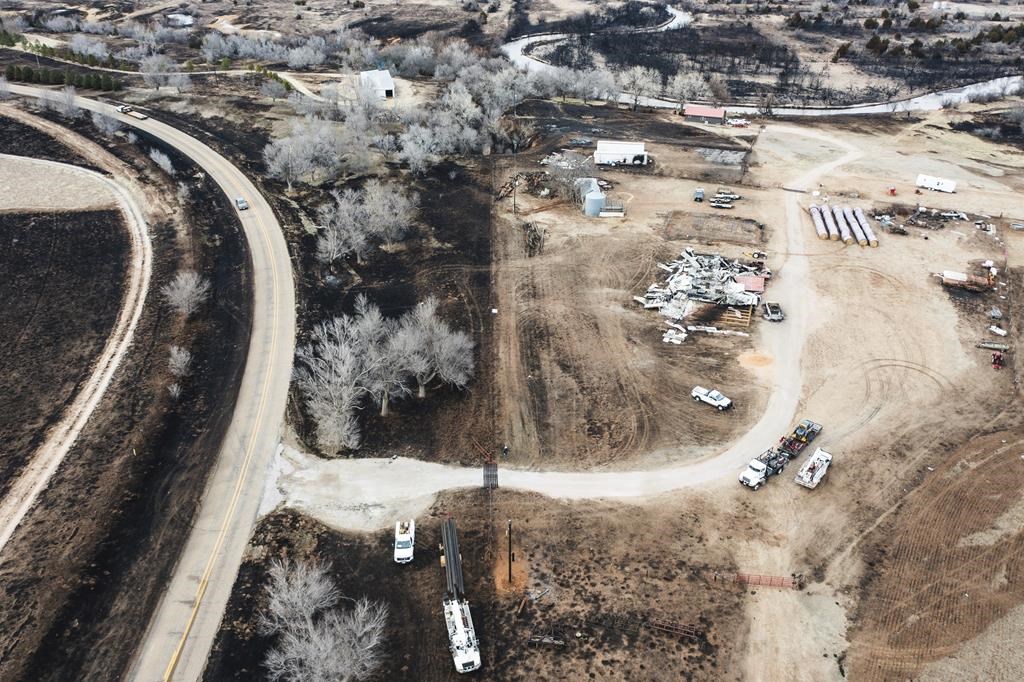Texas battles historic wildfires as snow covers scorched land in the Panhandle

Posted Feb 29, 2024 12:27:57 AM.
Last Updated Mar 1, 2024 10:10:38 AM.
STINNETT, Texas (AP) — A dusting of snow covered a desolate landscape of scorched prairie, dead cattle and burned out homes in the Texas Panhandle on Thursday, giving firefighters brief relief in their desperate efforts to corral a blaze that has grown into the largest in state history.
The Smokehouse Creek fire grew to nearly 1,700 square miles (4,400 square kilometers). It merged with another fire and is just 3% contained, according to the Texas A&M Forest Service.
Gray skies loomed over huge scars of blackened earth in a rural area dotted with scrub brush, ranchland, rocky canyons and oil rigs. In Stinnett, a town of about 1,600, someone propped up an American flag outside a destroyed home.
Dylan Phillips, 24, said he hardly recognized his Stinnett neighborhood, which was littered with melted street signs and the charred frames of cars and trucks. His family’s home survived, but at least a half a dozen others were smoking rubble.
“It was brutal,” Phillips said. “The street lights were out. It was nothing but embers and flames.”
The Smokehouse Creek fire’s explosive growth slowed Thursday as snow fell and winds and temperatures dipped, but it was still untamed and threatening. The largest of several major fires burning in the rural Panhandle section of the state, it has also crossed into Oklahoma.
Firefighter Lee Jones was helping douse the smoldering wreckage of homes in Stinnett to keep them from reigniting when temperatures and winds increase Friday and into the weekend.
“The snow helps,” said Jones, who was among a dozen firefighters called in from Lubbock to help. “We’re just hitting all the hot spots around town, the houses that have already burned.”
Authorities have not said what ignited the fires, but strong winds, dry grass and unseasonably warm temperatures fed the blazes.
“The rain and the snow is beneficial right now, we’re using it to our advantage,” Texas A&M Forest Service spokesman Juan Rodriguez said of the Smokehouse Creek fire. “When the fire isn’t blowing up and moving very fast, firefighters are able to actually catch up and get to those parts of the fire.”
Authorities said 1,640 square miles (4,248 square kilometers) of the fire were on the Texas side of the border. Previously, the largest fire in recorded state history was the 2006 East Amarillo Complex fire, which burned about 1,400 square miles (3,630 square kilometers) and resulted in 13 deaths.
Two women were the only confirmed deaths so far this week. But with flames still menacing a wide area, authorities had yet to conduct a thorough search for victims or tally the numerous homes and other structures damaged or destroyed.
Cindy Owen was driving in Texas’ Hemphill County south of Canadian on Tuesday afternoon when she encountered fire or smoke, said Sgt. Chris Ray of the state’s Department of Public Safety. She got out of her truck, and flames overtook her.
A passerby found Owen and called first responders, who took her to a burn unit in Oklahoma. She died Thursday morning, Ray said.
The other victim, an 83-year-old woman, was identified by family members as Joyce Blankenship, a former substitute teacher. Her grandson, Lee Quesada, said deputies told his uncle Wednesday that they had found Blankenship’s remains in her burned home.
President Joe Biden, who was in Texas on Thursday to visit the U.S.-Mexico border, said he directed federal officials to do “everything possible” to assist fire-affected communities, including sending firefighters and equipment. The Federal Emergency Management Agency has guaranteed Texas and Oklahoma will be reimbursed for their emergency costs, the president said.
“When disasters strike, there’s no red states or blue states where I come from,” Biden said. “Just communities and families looking for help. So we’re standing with everyone affected by these wildfires and we’re going to continue to help you respond and recover.”
Republican Gov. Greg Abbott issued a disaster declaration for 60 counties and planned to visit the Panhandle on Friday.
Nim Kidd, chief of the Texas Division of Emergency Management, said the weekend forecast and “sheer size and scope” of the blaze are the biggest challenges for firefighters.
“I don’t want the community there to feel a false sense of security that all these fires will not grow anymore,” Kidd said. “This is still a very dynamic situation.”
Jeremiah Kaslon, 39, a Stinnett resident who saw neighbors’ homes destroyed by flames that stopped just on the edge of his property, seemed prepared for what the changing forecast might bring.
“Around here, the weather, we get all four seasons in a week,” Kaslon said. “It can be hot, hot and windy, and it will be snowing the next day. It’s just that time of year.”
Encroaching flames caused the main facility that disassembles America’s nuclear arsenal to pause operations Tuesday night, but it was open for normal work by Wednesday. The small town of Fritch, which lost hundreds of homes in a 2014 fire, saw 40 to 50 more destroyed this week, Mayor Tom Ray said.
Texas Agriculture Commissioner Sid Miller estimated cattle deaths to be in the thousands, with more likely to come.
“There’ll be cattle that we’ll have to euthanize,” Miller said. “They’ll have burned hooves, burned udders.”
Miller said individual ranchers could suffer devastating losses. But he predicted the overall impact on the Texas cattle industry and on consumer prices for beef would be minimal.
___
Vertuno reported from Austin, Texas. Associated Press reporters Ty O’Neil in Stinnett, Texas; Jamie Stengle in Dallas; and Ken Miller in Oklahoma City contributed.
___
This story was first published on Feb. 29, 2024. It was updated on March 1, 2024, to correct the spelling of the last name of a Stinnett resident to Kaslon in one instance, instead of Kalson.
Sean Murphy And Jim Vertuno, The Associated Press








